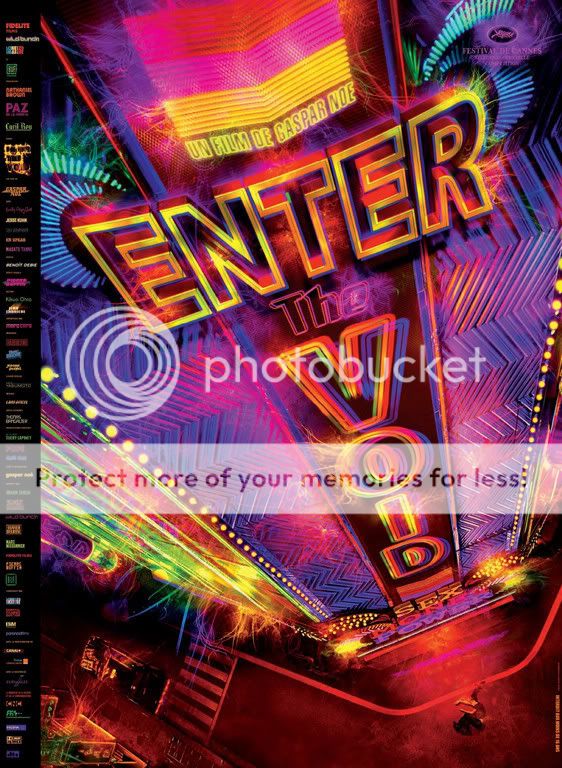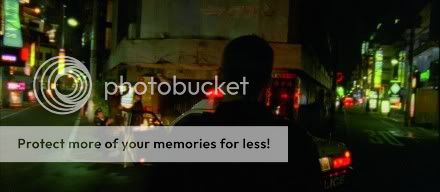Dark Victory
A$AP WAYNE
- Joined
- May 20, 2008
- Messages
- 6,466
- Reaction score
- 0
- Points
- 31

Gasper Noe's (Irreversible, Carne and Irreversible) new film. What else do you need to know?
For a quick sypnosis, Oscar and his sister Linda are recent arrivals in Tokyo. Oscar's a small time drug dealer, and Linda works as a nightclub stripper. One night, Oscar is caught up in a police bust and shot. As he lies dying, his spirit, faithful to the promise he made his sister ­ that he would never abandon her - refuses to abandon the world of the living. It wanders through the city, his visions growing evermore distorted, evermore nightmarish. Past, present and future merge in a hallucinatory maelstrom. Noe has described it as a "Psychedelic Melodrama".
The film was shown at Cannes last year, and like Irreversible, it was met with a mixed response. Though, no one could deny the film's unprecedented visual presentation.
http://www.ifc.com/blogs/thedaily/2009/05/cannes-enter-the-void.php"The only avant-garde film in Cannes' Competition is Gaspar Noé's 'Enter the Void,' which picks up the gauntlet thrown down by the Wachowskis' 'Speed Racer' of an endlessly malleable cinema of acid-trip colors and plastic gymnastics and runs with it to endless, forceful, and nihilistic results." Daniel Kasman in The Auteurs' Notebook: "Springing from ideas explored in video games from the past ten years and by Stanley Kubrick (stealing from '2001' wholesale but also brilliantly pursuing and exploring 'The Shining'), 'Enter the Void' literally takes a first-person view of its protagonist - a heavily tripping American drug dealer (Nathaniel Brown) living in Tokyo - until he dies and his vision is freed from his body, which proceeds to fly around the city following what happens to his corpse and to his beloved sister (Paz de la Huerta)."
"Although he remains dedicated to shaking up viewers, to getting under their skin and into their nervous systems, Mr Noé has mellowed," argues the New York Times' Manohla Dargis. This "is an exceptional work, though less because of its story, acting or any of the usual critical markers. What largely distinguishes it, beyond the stunning cinematography, is that this is the work of an artist who's trying to show us something we haven't seen before, even while he liberally samples images and ideas from Stanley Kubrick and the entirety of American avant-garde cinema. The grungy milieu and calculated shocks might have been designed to make you flee - even while your attention is tethered to the camera - but, really, these aren't the point. The point is the filmmaking."
"Almost defying definition in contemporary cinematic terms," writes Screen's Mike Goodridge, "Gaspar Noe's third feature film 'Enter The Void' is a wild, hallucinatory mind**** for adults which sees the director explore new shooting techniques and ambitious special effects to capture a young man's journey after death. More experience than narrative, it runs to a massive 163 minutes, meandering and careening in and out of story and into visual realms and moods that are nothing short of hypnotic. It is a film that will instantly achieve cult status among young adults. If audiences care to, they can lose themselves in Noe's images and trip on his imagination. If they don't, they will be bored to tears."
This is "perhaps the most challenging film to premiere in the Cannes Official Selection this year," blogs Matt Dentler. "I have a soft spot for the enfants terribles like Lukas Moodyson, Carlos Reygadas and Lars Von Trier. What these guys are doing is some of the bravest fictional filmmaking left in the world. And, like these fellow filmmakers, Gaspar Noe may need to go back in and trim his latest work. Not because it shouldn't shock and dare, but because it shouldn't meander."
As noted earlier, for Screen, Geoffrey Macnab reports that Noé "is hatching a sex film. He says the as yet untitled film will be a 'a joyful porn movie - a joyful movie with explicit sex.'"
Update: "Noé shows none of the excellent flourishes he used in 'Irréversible,'" writes David Bourgeois for Movieline: "the clever and effective use of flashbacks and reverse chronological storytelling used to weave the gripping story of a Paris woman savagely raped. Instead, we get a laughable and pointless mélange of flashbacks leading up to the shooting (which yields the following information: Oscar was a drug dealer), and scene upon scene of spectacularly colorful drug-induced hallucinations. Speaking of laughable, a few notes about the acting, if you can call it that. It's so atrocious, that it's a wonder if it was intentional, though I think that's giving Noé far too much credit.... To be fair, Noé rushed to get this print to Cannes - there weren't even open or closing credits or a title sequence. But even at two hours let's say, it's still unwatchable."
Updates, 5/23: "Billed by director Gaspar Noé as a 'psychedelic melodrama' inspired by his hallucinogen-powered screening of 'Lady in the Lake,' 'Enter the Void' suggests the Gallic provocateur should get some better drugs," writes Rob Nelson in Variety. "Not clever enough to be truly pretentious, Noé's tiresomely gimmicky film about a low-level Tokyo drug dealer who enjoys one long, last trip after dying proves to be the ne plus ultra of nothing much. Having come in under the wire for Cannes competition, 'Enter the Void' may once again be ready to enter the editing room."
"It goes without saying that the film is violent, but its obsessive emphasis on sex and drugs - to the point that most viewers are going to feel utterly bludgeoned by both - makes it virtually unwatchable, especially at its unofficial 'director's cut' length of 160 minutes," writes Peter Brunette in the Hollywood Reporter. "Couples coupling in fascinatingly diverse ways are shown over and over, and the whole thing ends in a kind of apocalyptic and ultra-silly sperm-meets-egg apotheosis that seems shot by what one wag of a critic later labeled a 'vagina-cam.' It also is suggested that Oscar's spirit crashes into a baby named Oscar in a plane flying overhead, presumably leading to his reincarnation."
"In terms of sheer mindblowing formal astonishment, Gaspar Noé's 'Enter the Void' is the movie I've been waiting for the entire festival," writes Mike D'Angelo at the AV Club. "It wouldn't be quite accurate to say it's like nothing you've ever seen, because you may have seen Noé's 'Irréversible,' which he now claims amounted to an elaborate test run for this project. I can believe it, even though - as sometimes happens - the sketch turned out superior to the actual canvas.... If only the movie's moronic content didn't keep distracting you from its exhilarating form."
"Gaspar Noé's 'Enter the Void' is disquieting and dreamy, as much a psychologically charged space as it is a conventional film narrative," blogs Scott Macaulay at Filmmaker. "Noé's decadent Tokyo riff on the 'Tibetan Book of the Dead' is structured around births, a death, and finds its twists through hypnotic tracking shots, strobe-lit effects and vertiginous clockwheeled pans. The film conceives its own sense of filmic structure, which makes the criticism that it's too long a bit puzzling to me. In that the consciousness of the protagonist becomes largely inaccessible to the viewer in the film's second half, I suppose this section is challenging, but to me that's where its eeriest psychological moments are. I liked it a lot."
"A massive narrative failure with simplistic plot devices, subpar acting and a droning structural approach that begs to be not trimmed but amputated, 'Void' nevertheless represents some of the most inventive filmmaking at the fest," writes Stephen Garrett at Time Out New York. "If there's one thing to be said about Cannes, it's the fact that three thousand people patiently sat through Noe's kaleidoscope of explicit images."
Updates, 5/26: "It cannot be denied that Noe is making an attempt to radically redefine the rules of cinema, and has succeeded in that he's made a film that looks like nothing that you've ever seen," writes Karina Longworth at the SpoutBlog. "Comparisons to Kubrick have been made, but they barely scratch the surface; the only thing that comes close, for me, as reference to understanding what it feels like to watch this film, is to suggest that you imagine a two and a half hour live action remake of the flying stuff from 'Waking Life,' with that film's dimestore philosophy replaced with stoner TIbetan Buddhist claptrap, incest anxiety and a lot (a lot a lot a lot a lot) of naked, writhing Paz de la Huerta. That 'Enter the Void' would be destined to become a college classic if anyone dared to release it is to essentially say two things: its innovation is entirely at the service of saying nothing worth contemplating whilst lucid, and that doesn't really matter because it's so visually seductive that it essentially flips the brain off switch for you."
Christoph Huber at La lectora provisoria: "Peranson>, correctly, right after the screening: 'Conceivably, the most stupid film ever made.'"
Update, 5/28: "Noé's self-proclaimed 'psychedelic melodrama' arrived 15 minutes longer than the published 150-minute running time, leading to widespread speculation that the Cannes version was in fact 'unfinished' - a generous designation for a film that should never have been started in the first place," writes LA Weekly's Scott Foundas. "Yet in Cannes, where no empty provocation is without its perverse defenders, there were some (including, rumor had it, at least one jury member) who praised 'Enter the Void' as a work of visual virtuosity, perhaps agreeing with the movie's zonked-out protagonist that 'dying would be the ultimate trip, you know?'"
Eric D. Snider agreed that, like Irreversible, it may be too polarizing for many, no one can deny the incredible visuals Noe and his team were able to capture.
http://www.cinematical.com/2010/01/24/sundance-review-enter-the-void/Thanks to Irreversible, the notoriously graphic film that stirred up Cannes and Sundance audiences a few years ago, Gaspar Noé is already well known as a pusher of buttons and a churner of stomachs. His latest, Enter the Void, is certainly not a departure from that, but it is quite a bit more palatable, not to mention more thematically mature. From a technical standpoint, it is a marvel. From every other standpoint, it is totally jacked up. But I mean that in a good way. I think.
Noé revels in trying the viewer's patience, and Enter the Void commences its assault in the opening credits, which are set to pounding techno music and bright flashing lights, and sped up so fast they're impossible to read. It's Noé's little joke, rushing hilariously through the credits in order to leave more time for the film itself ... which is 161 minutes long and is frequently, shall we say, unhurried.
The story is about a young American man named Oscar (Nathaniel Brown) who lives in Tokyo and spends his time taking drugs. (He is able to support this habit by also selling them.) His sister, Linda (Paz de la Huerta), works at a sex club. Orphaned as young children, Oscar and Linda have had to stick together, finding surrogates to fill the emotional and other needs normally filled by parents. Oscar and Linda have a lot of issues.
Oscar's issues are complicated slightly by his death. This occurs early in the film and is foreshadowed by a conversation with a friend, Alex (Cyril Roy), about the Tibetan Book of the Dead. But death is not the end for Oscar. His spirit -- or soul, or consciousness, or ghost -- rises from his body and floats over the rest of the film, drifting from place to place, an omniscient observer of the aftermath of his death.
He also takes a trip down memory lane, death having freed him from the usual constraints of linear time. We join him in reliving past experiences -- the accident that took his parents, his and Linda's childhood, the events that happened just before the movie started -- and all of these are presented as vignettes, dreamy snippets of memory, rather than fully formed "scenes."
And I'm not kidding when I say we "join" Oscar in these experiences. We are in his head. The entire film is told from his perspective -- often literally, with the camera as his eyes, and Oscar only visible to us if he looks in a mirror. (Those shots are pretty nifty, if you think about it. How did Noé hide the camera?) In other scenes, we see the back of Oscar's head, following him around as if in a first-person-shooter video game. To show us Oscar's uninhibited floating from one place to another, the camera is positioned over the set and pointed straight down; when we arrive at the new destination, we glide down to eye level and continue to observe. In some cases, Oscar appears to float right into someone, apparently accessing their consciousness and seeing through their eyes. The effect is unsettling: I suspect that the process of dying and then wandering around as a spirit would probably look, sound, and feel like this. At any rate, it's the most effective representation of it I've ever seen.
If the film sounds like it must be visually astonishing, it is. How were these sets constructed to allow so much overhead photography? Where are the cuts being made in the shots that look continuous but must have involved multiple sets? How much digital trickery is used? Like David Fincher, Noé loves to make the camera do impossible things and access impossible locations, and it's not just to show off. In this case, it's the best possible way to make Oscar our avatar.
Also like David Fincher, Noé likes to examine the dark, distasteful sides of humanity. Enter the Void is about death, but that's the least shocking of its themes. Incest, abortion, and the sexualization of children are also on the docket, not to mention the various sleazy dynamics between pimps and hookers, dealers and users, masters and slaves. Have you ever thought about how breast-feeding is a natural and wholesome thing between mother and child, but how most adult men are also sexually aroused by breasts? Gaspar Noé has! When a man sleeps with a woman old enough to be his mother, what does it mean? Noé has some theories (as did Sophocles and Freud).
There is plenty of sex on display, some of it titillating but most of it sad or angry or hollow. This, too, is one of Noé's themes, the idea that sex can mean so many different things, can be good or bad, all depending on who's involved and what the circumstances are. (See also: the dual nature of breasts.) Some of what Noé does is insanely over the top, though I admit he does take the first-person point of view to its logical extremes. Shocking though some of the events may be, everything fits with what came before. Nothing is gratuitous, nothing comes out of nowhere.
As usual for Noé, parts of Enter the Void are hard to watch -- only it's not because they're graphic or violent but because they consist of nothing more than ethereal sound effects and trippy light displays. It's how Noé conveys Oscar's wandering mind, whether the wandering is caused by drugs or death. This sort of thing, logical though it may be in context, can be exasperating, and the film is unquestionably too long anyway. But it's a powerfully bizarre movie, a psychedelic trip that must be experienced -- not just seen and heard but experienced -- to be believed.
Other reviews...
The film is scheduled to release in America sometime during September and on May 5th in France.
Trailers
[YT]mooCXnTMJUQ[/YT]
[YT]x_SgLWefSfY&feature=related[/YT]
[YT]o9B941MaqAs&feature=related[/YT]
[YT]tPxgi-PiNFE&feature=related[/YT]
Pictures





Last edited:


 Dark Victory was looking forward to this film it seems.
Dark Victory was looking forward to this film it seems.